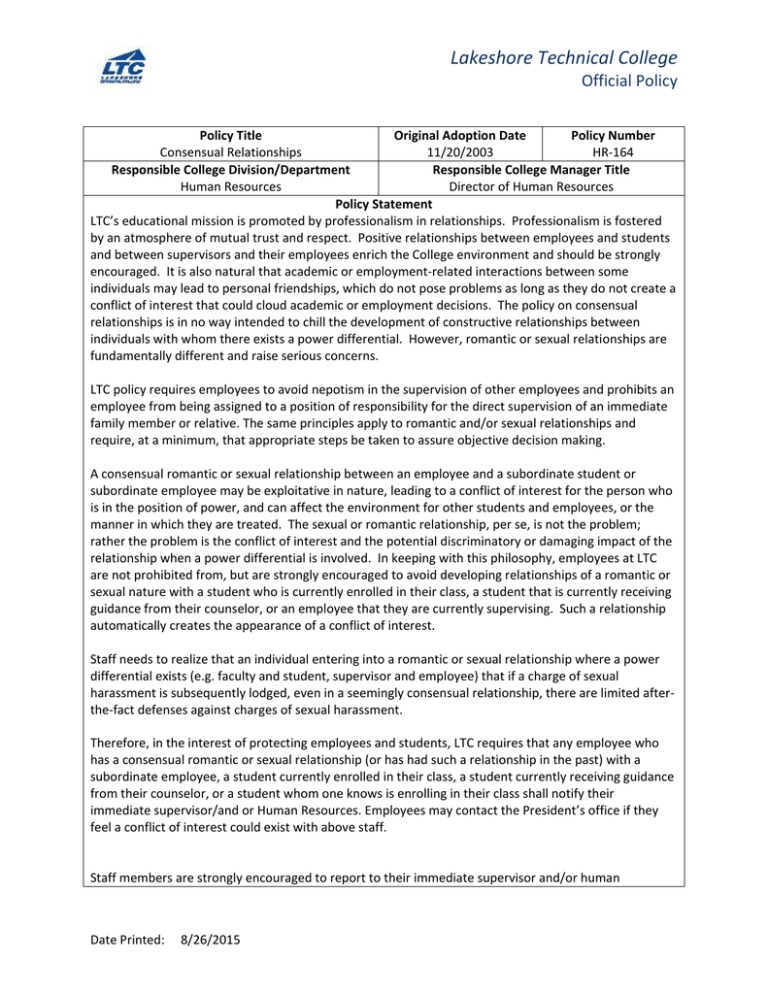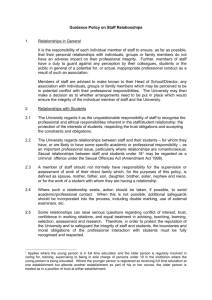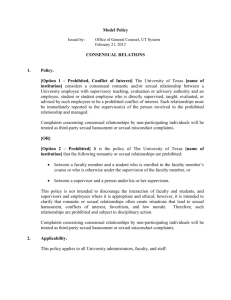
Lakeshore Technical College
Official Policy
Policy Title
Original Adoption Date
Policy Number
Consensual Relationships
11/20/2003
HR-164
Responsible College Division/Department
Responsible College Manager Title
Human Resources
Director of Human Resources
Policy Statement
LTC’s educational mission is promoted by professionalism in relationships. Professionalism is fostered
by an atmosphere of mutual trust and respect. Positive relationships between employees and students
and between supervisors and their employees enrich the College environment and should be strongly
encouraged. It is also natural that academic or employment-related interactions between some
individuals may lead to personal friendships, which do not pose problems as long as they do not create a
conflict of interest that could cloud academic or employment decisions. The policy on consensual
relationships is in no way intended to chill the development of constructive relationships between
individuals with whom there exists a power differential. However, romantic or sexual relationships are
fundamentally different and raise serious concerns.
LTC policy requires employees to avoid nepotism in the supervision of other employees and prohibits an
employee from being assigned to a position of responsibility for the direct supervision of an immediate
family member or relative. The same principles apply to romantic and/or sexual relationships and
require, at a minimum, that appropriate steps be taken to assure objective decision making.
A consensual romantic or sexual relationship between an employee and a subordinate student or
subordinate employee may be exploitative in nature, leading to a conflict of interest for the person who
is in the position of power, and can affect the environment for other students and employees, or the
manner in which they are treated. The sexual or romantic relationship, per se, is not the problem;
rather the problem is the conflict of interest and the potential discriminatory or damaging impact of the
relationship when a power differential is involved. In keeping with this philosophy, employees at LTC
are not prohibited from, but are strongly encouraged to avoid developing relationships of a romantic or
sexual nature with a student who is currently enrolled in their class, a student that is currently receiving
guidance from their counselor, or an employee that they are currently supervising. Such a relationship
automatically creates the appearance of a conflict of interest.
Staff needs to realize that an individual entering into a romantic or sexual relationship where a power
differential exists (e.g. faculty and student, supervisor and employee) that if a charge of sexual
harassment is subsequently lodged, even in a seemingly consensual relationship, there are limited afterthe-fact defenses against charges of sexual harassment.
Therefore, in the interest of protecting employees and students, LTC requires that any employee who
has a consensual romantic or sexual relationship (or has had such a relationship in the past) with a
subordinate employee, a student currently enrolled in their class, a student currently receiving guidance
from their counselor, or a student whom one knows is enrolling in their class shall notify their
immediate supervisor/and or Human Resources. Employees may contact the President’s office if they
feel a conflict of interest could exist with above staff.
Staff members are strongly encouraged to report to their immediate supervisor and/or human
Date Printed:
8/26/2015
Lakeshore Technical College
Official Policy
resources the fact that a consensual relationship has ended. In consultation with the staff member, an
assessment will be made as to the potential for any further conflict of interest or a claim or consequence
arising out of the end of the relationship, having impact upon LTC or the staff member when engaged in
official duties. An appropriate response will be developed based upon the assessment.
Reason for Policy
The policy on consensual relationships is written to protect employees and students. It is designed to
ensure that power is not abused and to maintain an environment that is free of sexual harassment,
rather than to discourage constructive interpersonal relationships.
Cross References and Legal Review
Reviewed/Revised: 10/22/04; 3/26/13
Equal Opportunity and Affirmative Action;
Discrimination & Harassment,
Progressive Discipline Policy,
Employee Code of Ethics and Conflict of Interest Policy
Legal Counsel Review and Approval:
Board Policy: III.A. General Executive Constraint, III.B. People Treatment, III.C. Compensation and
Benefits
Definitions
Consensual Relationship: Consensual relationships of concern to Lakeshore Technical College (LTC) are
those relationships of a romantic or sexual nature, entered into by an employee of the College, in which
the parties involved have consented, but where there is or appears to be a conflict of interest or a
power differential.
Sexual Relationship: Consensual participation in sexual acts which is not limited to and does not
necessarily culminate in intercourse. Includes consensual sexual touching. Both persons whether
participating actively or passively, engage in a sexual relationship. May also involve a romantic
relationship.
Romantic Relationship: Consensual, emotional affinity or interaction with another person which when
observed by another disinterested, "reasonable man or woman" would be perceived as evidence of
romantic involvement between the participants. Most often includes physical interaction such as kissing,
holding hands, arms around shoulders or waist, and other displays of affection, exceeding that
otherwise expected with regard to mere friendship or a working relationship. Capable of being assessed
on an objective basis. May also involve a sexual relationship.
To Whom Policy Applies: This consensual relationship policy exists for all College employees when the
interrelationships of staff members or the interrelationships of a staff member and a current student
present the appearance of a conflict of interest.
Date Printed:
8/26/2015





